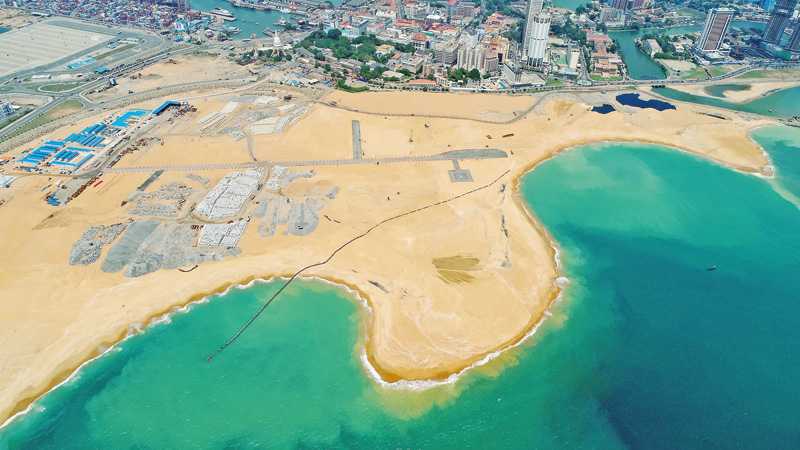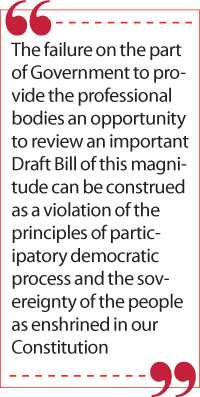Saturday Feb 14, 2026
Saturday Feb 14, 2026
Monday, 19 April 2021 00:12 - - {{hitsCtrl.values.hits}}

Port City work in progress
“Poorly drafted statutes are a burden on the entire state. Judges struggle to interpret and apply them. Attorneys find it difficult to base any sure advice upon them and the citizens desire to conform to them is confused. At times, totally unforeseen results are seen……. On many occasions, defects lead to litigation.” J. Menard, Legislative Counsel, USA
 The Draft Bill titled Colombo Port City Economic Commission Act 2021 is an important piece of legislation. It can be described as a game-changer for Sri Lanka. It is the biggest foreign investment received by Sri Lanka and it can lead to a success story as in many other countries. At this stage, review of the Draft Bill is of paramount importance, as it constitutes a marketing tool along with the master plan prepared by the Chinese Harbour Company Ltd.
The Draft Bill titled Colombo Port City Economic Commission Act 2021 is an important piece of legislation. It can be described as a game-changer for Sri Lanka. It is the biggest foreign investment received by Sri Lanka and it can lead to a success story as in many other countries. At this stage, review of the Draft Bill is of paramount importance, as it constitutes a marketing tool along with the master plan prepared by the Chinese Harbour Company Ltd.
Unfortunately, this Draft Bill was not subject to pre-parliamentary review by our professional organisations and the epistemic community. In modern times, there is a constitutional practice in Commonwealth countries to consult the stakeholders, professional bodies and the epistemic community in regard to important legislation. The Advisory Council appointed to draft the Securities Exchange Commission Bill 2019 under Dr. Kanag Iswaran of which I was the Drafting Consultant decided to involve the stakeholders and those interested in the subject matter by providing them with an exposure draft. It was a very useful exercise to clarify any ambiguities, inconsistencies and grey areas which can create problems in the implementation process.
Before I deal with the review of the draft Bill, I would like to provide a global perspective on legislation relating to port cities and special economic zones.
Global perspective
Legislation relating to port cities and special economic zones differ from one jurisdiction to another. There is no uniformity in such legislation, as ‘one size does not fit all’.
In Latin America and the Caribbean, special economic zones or offshore financial centres have grown piece-meal over a period of time to meet the needs and demands of the international business community. At the early stage, these countries enacted International Business Companies Act with no-tax or low-tax regime. Later on, they developed offshore banking, offshore trusts, offshore captive insurance and many other products and services to satisfy the needs and demands of high net-worth individuals and corporate clients.
Bahamas Offshore Banks and Trusts Act and the BVI Offshore Companies Act stand out as success stories. Likewise, Panama has registered several offshore shipping companies and provided them with the Panamanian flag to sail around the world. In Antigua and Barbuda introduced internet gambling and it was challenged by the USA, but they won the case at the WTO.
In Europe, similar developments took place in Switzerland, Ireland, Jersey, Isle of Man and Cyprus. These countries and territories have made many innovations to attract foreign investments by registering international business companies and later on by introducing various products and services. Switzerland is known for bank secrecy.
In the Middle East, new legislation was enacted to start on a clean slate. Both in Qatar and Dubai, they were confined to one piece of legislation and managed by Qatar Financial Services Authority and Dubai Financial Services Authority respectively according to regulatory policy and the law. It is very different from the way the English-speaking Common Law countries operate Special Economic Zones.
In Labuan (Malaysia), Dr. Mahathir Mohammed established the Labuan Offshore Financial Authority and introduced lengthy legislation on offshore banking, offshore trusts, offshore insurance, offshore partnerships, etc., so that they are guided by law and not by policy. It has proved to be a roaring success with the participation of a very few but very rich clientele.
In Sri Lanka, the Draft Bill provides the legal and regulatory framework to attract investments to develop the infrastructure of the Port City and also provide offshore products and services to the international business community. This legal framework is one of its kind and conceptually sound, as its scope and content can be expanded by the Economic Commission by way of Regulations, Rules, Orders and By-Laws. Hence, Sri Lanka has adopted the legislative technique of shorter parliamentary Act and longer Executive Regulations in drafting complex legislation, as advocated by Justice Crabbe at CALC meeting in Ocho Rios, Jamaica (1986).
On reading the Draft Bill, I find that there are few gaps and problems relating to legislative drafting. Hence, I wish to say something about legislative drafting before I undertake a constructive review of the Draft Bill for the sake of our children and grandchildren.
Legislative drafting
Legislative drafting is a form of communication very different to any other form of writing. It has no excess words and no repetitions. It must have clarity and simplicity, so that it could be understood clearly by stakeholders, statute users and investors.
Lord Thring, former First Parliamentary Counsel of UK, said about 150 years ago that legislation must be drafted in the same way as razors are made to sell. Hence, legislation should be marketable, effective and efficient to achieve the objectives enumerated therein. On this basis, I will now proceed to suggest a few changes to make the Draft Bill more attractive to investors and reduce ambiguities, lacunae and grey areas in the capacity of a Legislative Draftsman with 40 years’ standing in many Commonwealth countries.
Review of the Draft Bill
(a) Long title
The long title is too long. It must be clear and concise to capture the broad scope and content of the Draft Bill. I humbly suggest the following long title.
An Act to make the Colombo Port City a Special Economic Zone; to establish and empower the Economic Commission to promote, manage, regulate and attract investments to the Colombo Port City by establishing a single window; to attract corporate clients and high net worth individuals to establish offshore banks, offshore companies, residential condominium units, hospitals and any other product or service; to provide investors with incentives and tax exemptions; to establish International and National Dispute Resolution Centre within the Zone; and for matters connected therewith or incidental thereto.
(b) Preamble
The preamble to the Draft Bill is not attractive and should illustrate Sri Lanka’s competitiveness by reference to her strategic position in the Indian Ocean. I humbly submit the following opening lines to the preamble.
Whereas, Sri Lanka enjoys an enviable strategic advantage in the Indian Ocean as a gateway to West Asia, East Africa, Indian Sub-Continent and East Asia where the Chinese Belt and Road Initiative will impact on the Special Economic Zone along with the participation of other trading powers in this region and beyond...
(c) Part II of the Draft Bill
Part II of the Draft Bill deals with objectives, powers, duties and functions of the Commission. It is an important part and should include a clause to ensure that the prime duty of the Commission is to prevent money laundering and inflow of terrorist financing.
Clause 5(b) should be deleted and be substituted by the following sub-clause, in order to avoid inconsistency with the Board of Investment Act –
(b) Attract foreign direct investments to develop the infrastructure of the Port City with multiplier effect on the rest of the country.
It is useful to add immediately after paragraph (2) of clause 6, the following new paragraph (3), in order to allow local legal and accountancy firms in Sri Lanka to play a dynamic role as AGENTS in promoting investments in the Colombo Port City as in other Port Cities. The Offshore Directory provides a List of all agents operating in various jurisdictions. The Draft Bill does not appear to provide an opportunity to our lawyers and accountants to play a dynamic role in promoting investments as agents and this should be expressly stated in paragraph(3)
(3) In the exercise, performance and discharge of its powers and duties and functions under sub-section (1), the Commission shall approve agents who may represent offshore companies, offshore banks and other investors at the Commission by being resident in Sri Lanka.
(d) Part III of the Draft Bill
Part III deals with the composition, administration and management of the affairs of the Commission. The Commission has exclusive responsibility in granting registration to offshore banks and companies. A question may arise whether the Commission could register an offshore bank, if the Monetary Board refuses to give a license or classifies the license into class A, Class B and Class C Banks and impose certain conditions to protect investors as in other offshore financial centres.
The Commission needs to maintain a check-list of all black-listed investors with the assistance of other Special Economic Zones. Otherwise, criticisms will be mounted against the Commission.
The Commission needs to protect the reputation of the Colombo Port City. If something goes wrong, the Colombo Port City will not be a blessing but a curse. Hence, every endeavour should be made to prevent drug money or terrorist funds coming into the Colombo Port City in a devious manner. Such devious methods include numbered accounts and bearer shares. In this day and age, we cannot adopt the policy ‘Let the robber barons come’, as the international community will be watching us at every step as to how we handle our offshore business.
Lack of proper scrutiny of the investors may lead to a disaster. In Antigua and Barbuda, Robert Allen Stanford obtained a license to operate an offshore investment bank. He built several offices, condominiums and sponsored 20/20 Cricket Tournaments. Later on, he was convicted of a Ponzi scheme and was sentenced to imprisonment by an US Court for a period of 120 years. In 2015 when I visited Antigua, I was shocked to see that a part of the Financial Centre was like a Ghost City.
(e) Part V of the Draft Bill
Part V deals with the Director-General and the Staff of the Commission. There should be a provision in this part to say that the Director-General and the staff of the Commission shall be deemed to be public servants under the Bribery Act and the Penal Code.
(f) Part VII of the Draft Bill
Part VII deals with the registration of offshore companies. It is not something new to Sri Lanka. Offshore companies were introduced under the 1982 Companies Act, so that youth in Sri Lanka could be employed as seafarers in these offshore shipping companies. It was a dream of late Lalith Athulathmudali to register offshore shipping companies as in Panama and provide opportunities for our youth to be seafarers, marine engineers and pilots.
Offshore company registration under the Companies Act 1982 and the Companies Act 2007 failed for several reasons. The tax regime was not clearly laid down. The provisions relating to offshore companies were inadequate to deal with issues relating to offshore shipping. A provision should be included in this Part of the Draft Bill to make Regulations relating to offshore companies, especially offshore shipping companies, offshore trusts companies, offshore insurance companies, etc., if we were to develop this concept to its logical ends as a competitive destination in the offshore world.
The Economic Commission provides offshore companies with tax exemptions and fiscal incentives, case by case, and thereafter such exemptions and incentives will be submitted for Cabinet approval. Once approved, President will make an Order and it will be gazetted and be laid before Parliament. Hence, it is likely that mere brass plate offshore companies will not be able to operate in the Colombo Port City.
(g) Part VIII of the Draft Bill
Part VIII deals with offshore banking. The definition of ‘banking business’ in the Draft Bill is too narrow, if we were to attract reputed banks to operate in the Colombo Port City. The definition should include Investment Banking and Islamic Banking. Regulations made under this Part are of paramount importance to avoid crisis situations. Regulations made under Clause 45 must deal with confidential relationships and bank secrecy. It is the hen that lays the golden egg, as secrecy is fundamental to attract offshore banking business.
On many occasions, law enforcement agencies of other countries may require documentation relating to bank accounts. Sometimes they will subpoena such bank officials when they enter their country. (See: USA vs Bank of Nova Scotia (1982)). Hence, there should be a mechanism either in the Draft Bill or in the Regulations to deal with such requests by the Commission if there is a prima facie evidence against a particular bank or a personal account.
Constitutionality of the Draft Bill
The purpose of this article is not to deal with the constitutionality of the Draft Bill, as this matter is before the Supreme Court of the Sri Lanka. The issues are likely to be very controversial but some claims relating to unconstitutionality are not justifiable and spurious. It is a different ball game as we are dealing with foreigners in regard to their offshore operations and therefore discrimination with nationals may not arise on reasonable ‘differetia’. However, the failure on the part of Government to provide the professional bodies an opportunity to review an important Draft Bill of this magnitude can be construed as a violation of the principles of participatory democratic process and the sovereignty of the people as enshrined in our Constitution. South African Constitutional Court in ‘Doctors for Life vs Speaker’ (2006) invalidated an Act of Parliament as it failed to consult the professional bodies and the Court thereafter recommended to the Legislature to re-enact the same Act after consulting the relevant professional bodies.
 Concluding remarks
Concluding remarks
Managing the Colombo Port City by the Economic Commission is an onerous task. The Draft Bill is only ‘the tip of the iceberg’ and many regulations, rules, by-laws, etc. need to be made to deal with offshore products and services, condominiums, time shares, stock exchange and hospitals within its area of governance.
It is wrong, unfair and unpatriotic to say that this Draft Bill will convert the Port City into a Chinese colony. Sri Lanka will welcome all countries from the East and West to establish international business companies, international banks, hospitals, condominiums, etc. in a strategic location, notwithstanding Rudyard Kipling’s saying ‘East is East, and West is West, and never the twain shall meet’.
Offshore business is competitive. The developed countries such as the UK and USA have a ‘row’ with the developing countries for initiating offshore financial centres, as they reduce their tax revenue from high net worth individuals and corporate entities. However, there is duplicity in this matter more severe than the ‘Geneva process’, as they encourage territories under their control to transfer money to UK or USA banks and stock exchanges and impose restrictions on those countries which do not transmit their deposits or invest in stock exchanges in the UK and the USA. Hence, we must be prepared to meet this challenge.
(The writer is a law graduate of the University of Ceylon and holds postgraduate qualifications from the University of Cambridge, UK. He served as UN Legal Expert, Legal Consultant and Legal Draftsman to many Asian, African and Caribbean countries. He has drafted legislation relating to offshore products and services and handled legal issues on these matters in the Caribbean. Email: [email protected].)